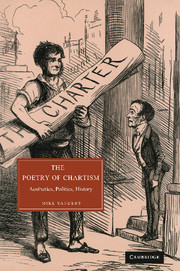Book contents
- Frontmatter
- Contents
- Acknowledgements
- CAMBRIDGE STUDIES IN NINETEENTH-CENTURY LITERATURE AND CULTURE
- Introduction
- 1 The Chartist imaginary: ‘talking by turns of politics and poetry’
- 2 Chartist poetry and literary history
- 3 ‘A jackass load of poetry’: the Northern Star's poetry column 1838–1852
- 4 Insurrectionary sonnets: the ideological afterlife of the Newport uprising
- 5 ‘Merry England’: memory and nostalgia in the year of the mass strike
- 6 ‘The future-hastening storm’: Chartist poetry in 1848
- 7 Constellating Chartist poetry: Gerald Massey, Walter Benjamin and the uses of messianism
- Appendix A Three Chartist poems
- Appendix B Details of poetry published in the poetry column of the Northern Star
- Bibliography
- Index
3 - ‘A jackass load of poetry’: the Northern Star's poetry column 1838–1852
Published online by Cambridge University Press: 11 July 2009
- Frontmatter
- Contents
- Acknowledgements
- CAMBRIDGE STUDIES IN NINETEENTH-CENTURY LITERATURE AND CULTURE
- Introduction
- 1 The Chartist imaginary: ‘talking by turns of politics and poetry’
- 2 Chartist poetry and literary history
- 3 ‘A jackass load of poetry’: the Northern Star's poetry column 1838–1852
- 4 Insurrectionary sonnets: the ideological afterlife of the Newport uprising
- 5 ‘Merry England’: memory and nostalgia in the year of the mass strike
- 6 ‘The future-hastening storm’: Chartist poetry in 1848
- 7 Constellating Chartist poetry: Gerald Massey, Walter Benjamin and the uses of messianism
- Appendix A Three Chartist poems
- Appendix B Details of poetry published in the poetry column of the Northern Star
- Bibliography
- Index
Summary
The recovery of nineteenth-century working-class reading practices has proceeded apace in recent years. Paul Murphy's Towards a Working-Class Canon tracks the changing attitudes towards literature expressed in radical journals between 1816 and 1858, whilst Jonathan Rose's The Intellectual Life of the British Working Classes demonstrates the deep and persistent drive to cultural literacy within the working-class movement. Most recently, Ian Haywood in The Revolution in Popular Literature has traced the British state's responses to the emergence of the ‘common reader’ in the 1790s, demonstrating that policies of direct repression of the radical press were also accompanied by attempts to provide alternative reading material, thereby making the periodical press one of the most significant sites of political struggle between 1790 and 1860.
Despite acknowledging the importance of the Chartist press, historians have been reluctant to grant literary production the same significance and agency which they so readily accord to literacy. For example, whilst Dorothy Thompson in The Early Chartists insists on ‘a definition of Chartism … as the response of a literate and sophisticated working class’, her selection of representative Chartist documents contains not a single poem. Similarly, Edward Royle's Chartism discusses the careers of Thomas Cooper and Ernest Jones without once mentioning their poetry, whilst a chapter entitled ‘Chartist Culture’ makes no reference to Chartist poetry. As the previous chapter has shown, more recently historians have begun to treat Chartist poetry as a central rather than an incidental aspect of the movement.
- Type
- Chapter
- Information
- The Poetry of ChartismAesthetics, Politics, History, pp. 69 - 86Publisher: Cambridge University PressPrint publication year: 2009

